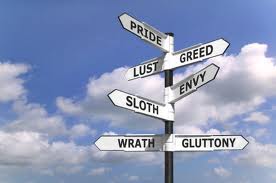There’s a passage in CS Lewis’s The Great Divorce where one of the ghosts offers up the red lizard of lust that sits constantly on his shoulder, whispering in his ear. The ghost begs an angel to kill the lizard, although the lizard assures the ghost that his death will mean the death of them both. The lizard dies, and both ghost and lizard are transformed. The ghost becomes a man – a glorious risen spirit – and the lizard is transformed into a stallion, full of beauty and power.
There's a needed balance in understanding religious rules. Political and nonsensical issues aside, some things the rules mention aren't simply disqualifiers on judgement day. Just because you did this or that, you're not some poor, unfortunate person who in the end didn't get the right boxes checked. The rules point to things that are in and of themselves deadly now. Like sticking your hand in the fire, doing so will burn you. Like living a life of selfishness will dehumanize you, or like living at the porn trough will cripple you in love and relationships. Life can be hellish long before the end. Some things are just deadly.“Do ye understand all this, my Son?” said the Teacher.“I don’t know about all, Sir,” said I. “Am I right in thinking the Lizard really turned into the Horse?”“Aye. But it was killed first. Ye’ll not forget that part of the story?”“I’ll try not to, Sir. But does it mean that everything – everything – that is in us can go on to the Mountains?”“Nothing, not even the best and noblest, can go on as it now is. Nothing, not even what is lowest and most bestial, will not be raised again if it submits to death. It is sown a natural body, it is raised a spiritual body. Flesh and blood cannot come to the Mountains. Not because they are too rank, but because they are too weak. What is a Lizard compared with a stallion? Lust is a poor, weak, whimpering whispering thing compared with that richness and energy of desire which will arise when lust has been killed.”“But am I to tell them at home that this man’s sensuality proved less of an obstacle than that poor woman’s love for her son? For that was, at any rate, an excess of love.” [The narrator had just observed a ghost begging for the son she had idolised, and for whom she had neglected all other relationships.]” Ye’ll tell them no such thing,” he replied sternly. “Excess of love, did ye say? There was no excess, there was defect. She loved her son too little, not too much. If she had loved him more there’d be no difficulty. I do not know how her affair will end. But it may well be that at this moment she’s demanding to have him down with her in Hell. That kind is sometimes perfectly ready to plunge the soul they say they love in endless misery if only they can still in some fashion possess it. No, no. Ye must draw another lesson. Ye must ask, if the risen body even of appetite is as grand a horse as ye saw, what would the risen body of maternal love or friendship be?”
In the end, I suspect, there are just two kinds of people. Those who live, saying to their creator, "thy will be done," and those to whom the creator at the end must say, "thy will be done."



















